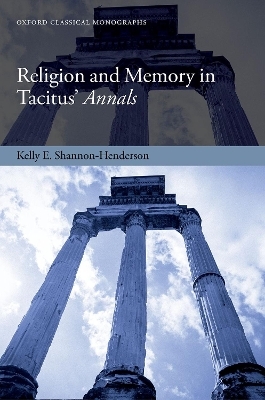
Religion and Memory in Tacitus' Annals
Oxford University Press (Verlag)
978-0-19-883276-8 (ISBN)
Throughout his narrative of Julio-Claudian Rome in the Annals, Tacitus includes numerous references to the gods, fate, fortune, astrology, omens, temples, priests, the emperor cult, and other religious material. Though scholars have long considered Tacitus' discussion of religion of minor importance, this volume demonstrates the significance of such references to an understanding of the work as a whole by analyzing them using cultural memory theory, which views religious ritual as a key component in any society's efforts to create a lived version of the past that helps define cultural identity in the present. Tacitus, who was not only an historian, but also a member of Rome's quindecimviral priesthood, shows a marked interest in even the most detailed rituals of Roman religious life, yet his portrayal of religious material also suggests that the system is under threat with the advent of the principate. Some traditional rituals are forgotten as the shape of the Roman state changes while, simultaneously, a new form of cultic commemoration develops as deceased emperors are deified and the living emperor and his family members are treated in increasingly worshipful ways by his subjects. This study traces the deployment of religious material throughout Tacitus' narrative in order to show how he views the development of this cultic "amnesia" over time, from the reign of the cryptic, autocratic, and oddly mystical Tiberius, through Claudius' failed attempts at reviving tradition, to the final sacrilegious disasters of the impious Nero. As the first book-length treatment of religion in the Annals, it reveals how these references are a key vehicle for his assessment of the principate as a system of government, the activities of individual emperors, and their impact on Roman society and cultural identity.
Kelly E. Shannon-Henderson holds a DPhil. in Greek and Latin Languages and Literature from the University of Oxford and is currently Assistant Professor of Classics in the Department of Modern Languages and Classics at the University of Alabama. She is the author of several articles on Roman religion, ancient historiography, paradoxography, and the literature of the Roman Empire.
0: Introduction: Religion, Memory, and Tacitus
0.1 Religion and memory
0.2 Tacitus, priest and historian: taking the religious dimension seriously
0.3 Types of material
0.4 The structure of this study
1: Tiberius the Autocrat
1.1 Introduction: Tiberius perinde divina humanaque obtegens
1.2 Funeral, apotheosis, and recusatio
1.3 The use and abuse of Divus Augustus: the maiestas disease
1.4 The emergence of religious flattery
1.5 Maiestas-disease meets adulatio-disease: the trial of Libo Drusus
1.6 Tiberius controlling the triumph
1.7 Conclusions
2: Germanicus as Religious Interpreter
2.1 Introduction: Germanicus and religious memory
2.2 Germanicus' religious rhetoric in the German mutiny
2.3 Memoria deformes: commemorating Varus
2.4 Gods on our side? Dreams, signs, and vengeance
2.5 Germanicus abroad
2.6 Death and Piso
2.7 Conclusions
3: Memory and Forgetting from the Death of Germanicus to the Rise of Sejanus
3.1 Introduction
3.2 Commemoration, flattery, vengeance: Germanicus' funeral and Piso's trial
3.3 Policing traditions: the flamen dialis
3.4 Temple asylum: the Senate and cultic memory
3.5 Augusta, Fetiales, and the Senate
3.6 Conclusions
4: Divine Wrath and Annals 4
4.1 Fortuna, divine wrath, and the rise of Sejanus
4.2 Amnesia and memory: temples and priesthoods
4.3 Cultic memory, Augustus' deification, and Tiberius' reputation
4.4 Aftermath of the Spanish temple refusal
4.5 Withdrawal, disaster, and the perversion of ritual
4.6 Conclusions
5: Fate, Astrology, and the End of Life
5.1 Introduction
5.2 Commemorating Livia
5.3 Remembering Sejanus
5.4 Sibylline books: an attempt at tradition
5.5 Tiberius the astrologer
5.6 Interpreting the phoenix
5.7 Commemorating Augustus, predicting Caligula
5.8 Conclusions
6: Claudius and the Failure of Tradition
6.1 Introduction: what we have lost
6.2 Trials and cultic memory for a new reign: Claudius the censor
6.3 Messalina and the misuse of ritual
6.4 Rise of Agrippina: flattery and impiety
6.5 Divine anger and the rise of Agrippina and Nero
6.6 Death, astrology, and deification
6.7 Conclusions
7: Nero: A Narrative in Prodigies
7.1 Introduction
7.2 Kin murder and divine wrath I: Britannicus
7.3 Kin murder and divine wrath II: Agrippina
7.4 When will Nero be punished? The problems of prodigies
7.5 Octavia's death and growing adulatio
7.6 The horrible year ad 64
7.7 Impiety and misinterpretation in the Pisonian conspiracy
7.8 Fortune's playthings
7.9 Wrath of the gods
7.10 Conclusions
8: Conclusions
Endmatter
Bibliography
Index
| Erscheinungsdatum | 27.01.2019 |
|---|---|
| Reihe/Serie | Oxford Classical Monographs |
| Verlagsort | Oxford |
| Sprache | englisch |
| Maße | 164 x 237 mm |
| Gewicht | 796 g |
| Themenwelt | Literatur ► Klassiker / Moderne Klassiker |
| Geschichte ► Allgemeine Geschichte ► Vor- und Frühgeschichte | |
| Geisteswissenschaften ► Sprach- / Literaturwissenschaft ► Anglistik / Amerikanistik | |
| Geisteswissenschaften ► Sprach- / Literaturwissenschaft ► Literaturwissenschaft | |
| ISBN-10 | 0-19-883276-1 / 0198832761 |
| ISBN-13 | 978-0-19-883276-8 / 9780198832768 |
| Zustand | Neuware |
| Informationen gemäß Produktsicherheitsverordnung (GPSR) | |
| Haben Sie eine Frage zum Produkt? |
aus dem Bereich


